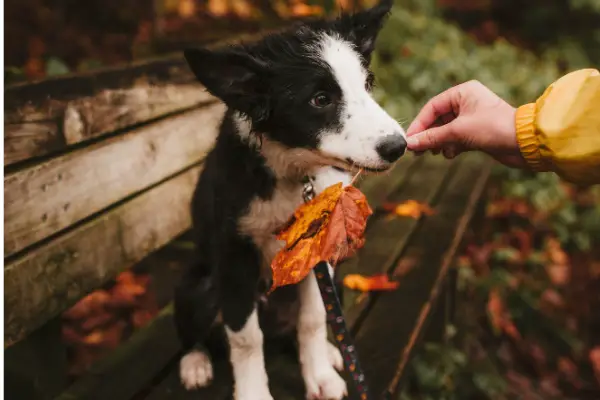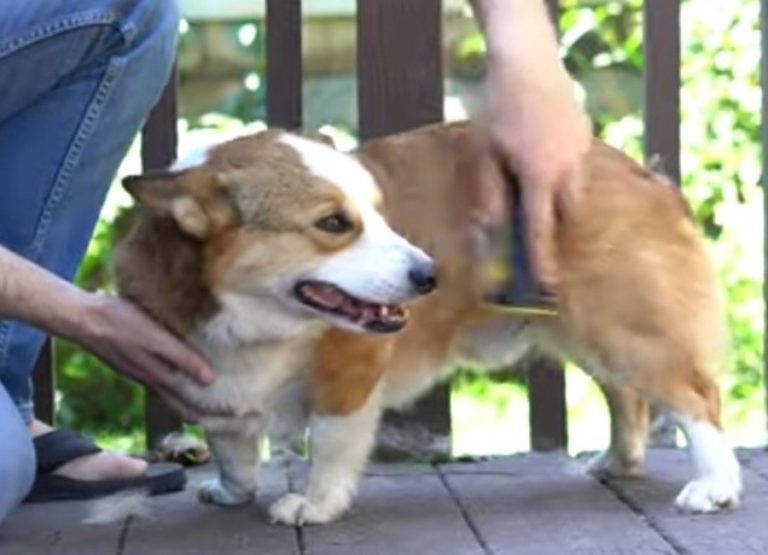Border Collies And Kids: 7 Pros, Cons & Guidelines

Border collies and kids can get along very well if properly introduced to each other and with proper supervision.
Getting a border collie if you have a kid comes with lots of pros and cons which I will outline in this post.
I will also discuss some common ways to help you teach both your kids and border collie to get along. Let’s discuss…
Border Collies And Kids
Are border collies good with kids? Yes, border collies are a working breed of dog that gets along very well with active kids if proper training and socialization are implemented.
Due to their high work ethic, active personality, and herding tendencies, most border collies have difficulty getting along with non-active kids.
The border collie is not the right breed of dog for families with lazy kids who can’t keep up with the active nature of this breed.
This doesn’t mean you can’t get them to stay together, but you should make sure your border collie gets enough exercise and mental stimulation.
If you have kids who are active, then the border collie is just the best breed for them as this breed is ready to run all day as long as your kids can keep up.
Let’s discuss some common pros and cons of getting a border collie if you have kids.
Reasons to get a border collie for kids
The following are some of the most compelling reasons to consider getting a border collie for your kids:
- Border collies that are energetic can assist children to become more active and live healthier lifestyles.
- An active border collie can assist to relieve or avoid children’s anxiety, boredom, and sorrow.
- The border collie may be able to assist children in learning responsibility for others around them.
- While you are away, an energetic border collie can keep your children occupied.
- The border collie can assist your kids in being more social and confident.
- A border collie can contribute to the development of trust and patience in children.
- Border collies are inherently social dogs who like having company, and children may provide that.
Why are Border Collies not good with kids
There are a few things to consider before purchasing a border collie if you have kids:
- Children may find it challenging to cope with a border collie because of their high energy levels.
- Border collies are terrified of loud noises, yet your kids may like screaming or creating loud noises.
- Border collies grow addicted to the ball quickly, and if they don’t get it, they’ll nip or bite your kids.
- Border collies are known to bark a lot, which can become a problem for kids.
- This breed can unintentionally knock over your kids and hurt them.
- Border Collies are ultra-energetic dogs that are not for every kid.
- Border Collies may try to herd your kids which may hurt kids.
- Without enough mental stimulation, border collies can exhibit destructive behavior which is not good for kids.
Warning signs you shouldn’t ignore
If you have a border collie and a kid here are some warning signs you shouldn’t ignore:
- When one of your children continually strikes, kicks grabs, and pulls on the border collie because he or she is unsure what to do with them.
- Even though the toddler does not bother the dog in any way, the dog always growls at him with bared fangs.
- When your border collie won’t let you inside the room or area where your child is.
- The border collie continues to snap at your kids for no apparent reason.
- When your border collie always runs away from your kids for no apparent reason.
Ways to train kids and border collies to get along
Here are some tried-and-true methods for helping children get along with a border collie:
1. Make rules, limitations, and boundaries
Setting clear house rules for both your children and your border collie will make life much easier for everyone.
Make sure you have established and let your border collie and kids adhere to clear house rules.
Allowing your border collie to eat from your child’s plate, for example, is not a good idea.
While you are away, make sure that kids under the age of three are not permitted to play with the border collie toys.
Because pet toys are not subject to the same safety requirements as children’s toys, they may be dangerous in the hands of kids while you are away.
Whatever your house rules are, make sure you stick to them since this will teach your border collie and your children discipline.
Recommended: 13 Hacks on How To Discipline a Border Collie.
2. Educate your kids to respect a border collie spot
Educate your kids to let your border collie alone when it is eating, sleeping, or needs to be alone.
Educate your kids to recognize when it is time to let a border collie go.
Your border collie will require space to eat and sleep, as well as room to develop.
This is a fantastic guideline to follow if your children are always racing to get close to your border collie.
It will help your border collie to rest and take some natural pauses.
Border collies must be left alone sometimes, and you should educate your children when this is appropriate.
Border collies and kids should be taught to respect each other privacy.
3. Educate kids not to scream at border collies
Border collies are generally friendly dogs, however, they might be depressed by loud noises and screaming.
Therefore, you should instill in your children the importance of never yelling or screaming at your border collie.
Make sure your kids understand that shouting at a border collie can lead to undesirable behaviors like biting, barking, and aggression.
4. Educate kids how to show affection to border collies
To your kids how to show affection or pet a border collie, begin by massaging the dog’s chin or chest lightly.
Scratching is OK as long as your hands do not touch the dog’s face or head.
Demonstrate teach the child that light neck and back caressing or scratching is OK in exchange for modest chin/chest petting or scratching.
Teach children how to turn 180 degrees in the direction of the fur to assist border collies to relax.
If the border collie backs away, snaps growl, or makes appeasement gestures or terrified body language, stop handling him.
Before you leave your children with a border collie, make sure they grasp these points.
5. Educate kids on how to handle a border collie
Handling a border collie is very important to kids, mishandling may lead to bite or nip.
Your kids will want to squeeze border collies since they are little and soft, but they are not toys.
Educate your children on how to properly care for and treat their border collies, as well as how to value them as living beings.
Border collies, like people, have desires, feelings, and pain, which your children should be aware of.
Your children should be able to play with your border collie without being pushed or constrained.
Candy, chocolate, garlic, and onions are some of the most toxic foods for border collies, and they’re common in human cuisine.
A good amount can cause gastrointestinal pain in border collies, but it has no effect in humans.
Allowing your border collie to nibble on your child’s food may result in begging, which is tough to prevent even with thorough training.
Therefore, your children should be educated not to feed their own food to the border collie.
7. Call your kids to join during grooming
Grooming time with rewards is a great time to improve the relationship between your border collie and your kids.
Depending on their age and your lifestyle or daily routine, you should teach your children the essentials of brushing sessions by standing close to your border collie.
There’s no reason why your children can’t assist you with grooming your border collie, particularly when it comes to combing and shampooing his coat.
Grooming is an excellent time to create connections since you’ll have a helper who can take up these activities once your child is older.

![How to Treat a Broken Dog Nail [A Step By Step Guide] How to Treat a Broken Dog Nail](https://petcreeks.com/wp-content/uploads/2023/09/igor-bumba-V9JMh9A-10E-unsplash.jpg)




